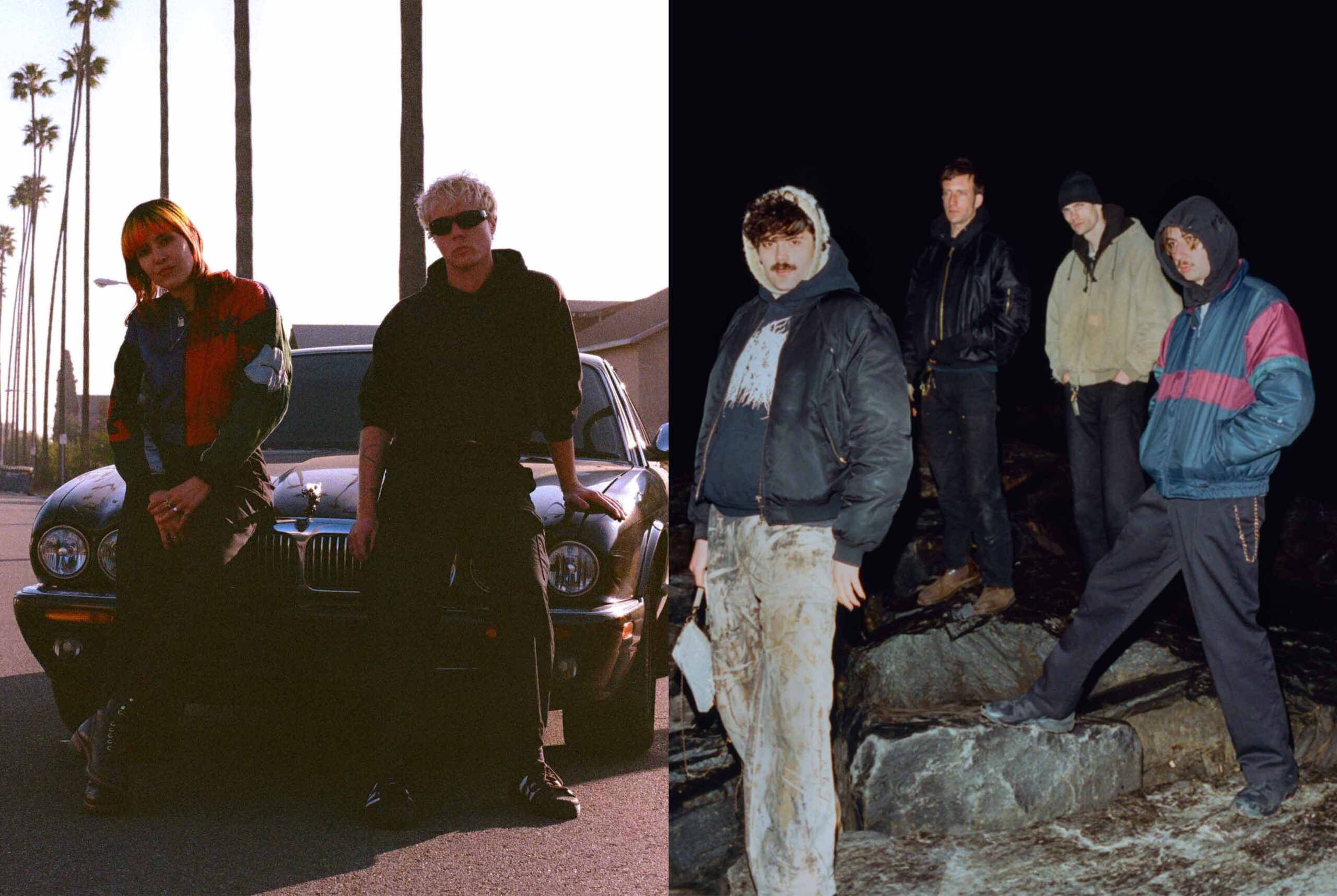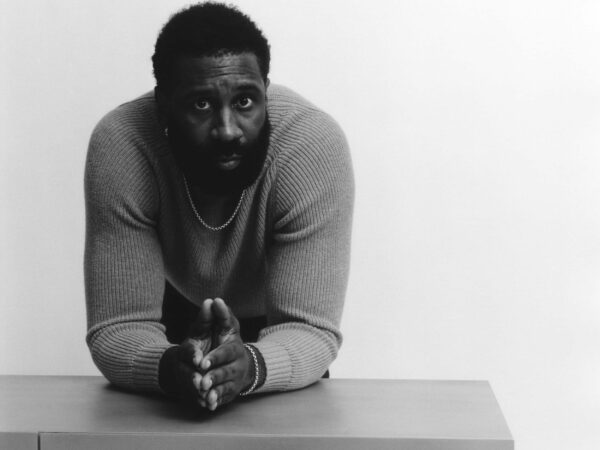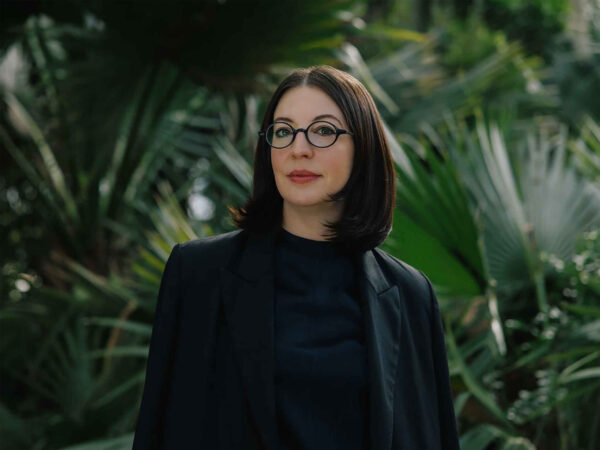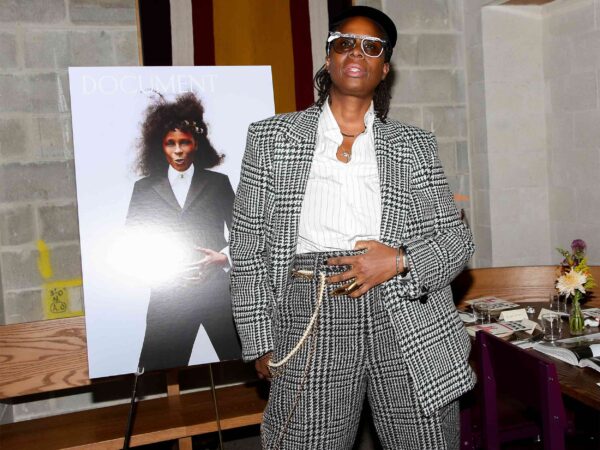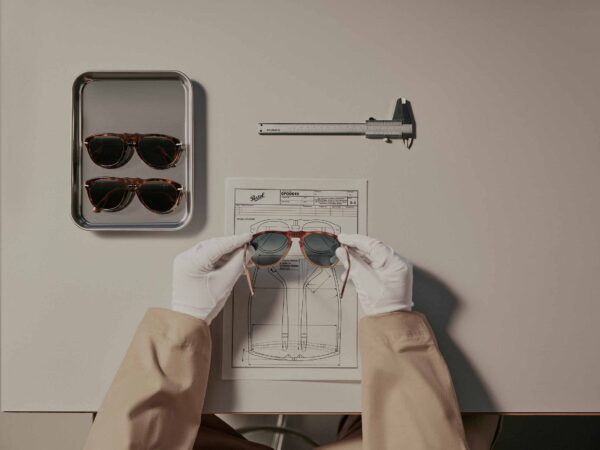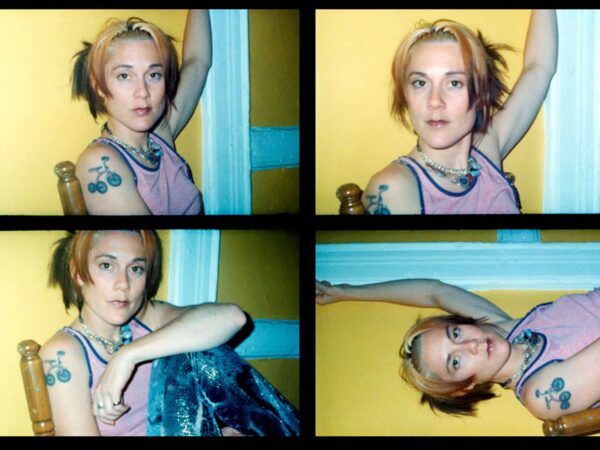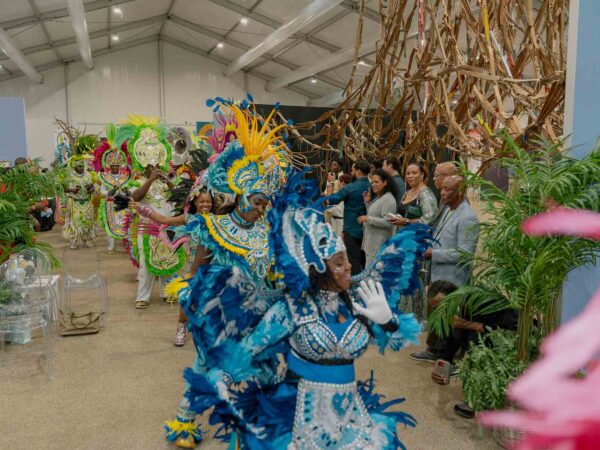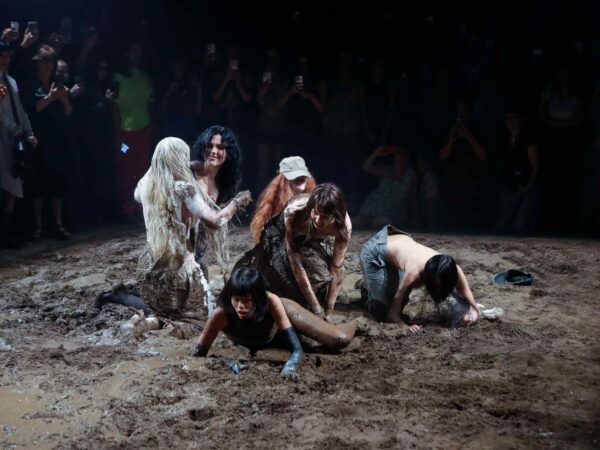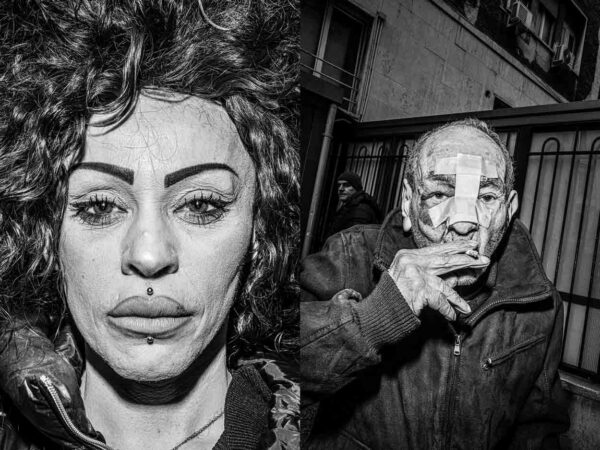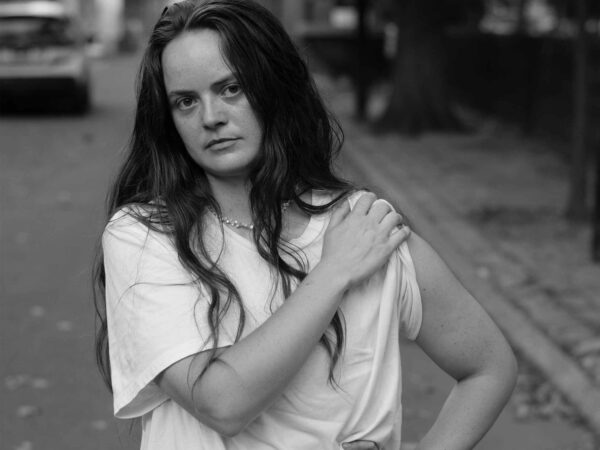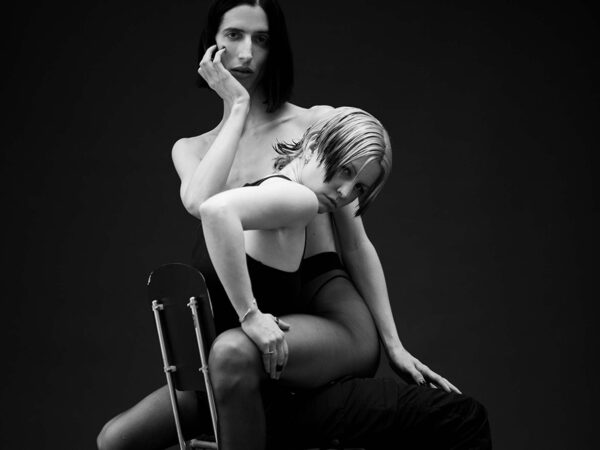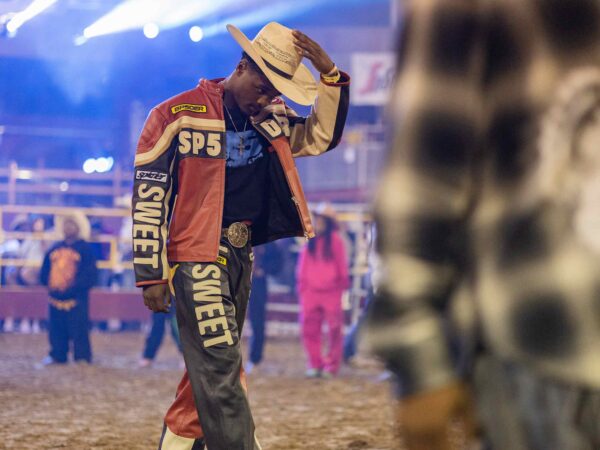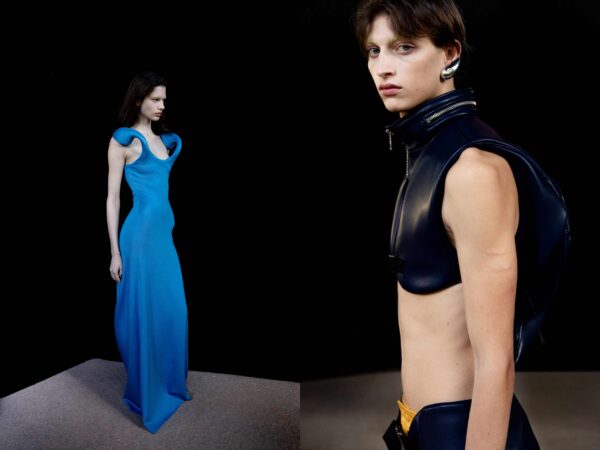On the heels of their new releases, 'Pirouette' and 'yes, please.,' the artists convene to discuss process, connection, and survivalism through art
As the world burns, Model/Actriz and Sextile are thrashing in the smoke. Standing at the precipice of a techno-clash movement fueled by unrest, both groups have pioneered their singular sounds over the last 10 years, catapulting music beyond the framework of genre revivalism. Cutting their teeth in DIY venues, staking their position as stalwarts of the underground, and moving to festival mainstages, their intensity and demand for the disruption of the status quo are kindred. Model/Actriz’s Pirouette (True Panther) and Sextile’s yes, please. (Sacred Bones) are new albums both released on May 2nd. The records are urgent calls for riotous communion. Listeners receive music with a pulse that thrives outside of algorithm fatigue and pushes people through the numbness of perpetual crisis to seize their own reality— a testament to how artists who revel in risk and vulnerability, champion connection with their audiences.
Model/Actriz is not a band that you seek out, but one that finds you. Never shying away from the nakedness of vulnerability, on Pirouette, Cole Haden’s confessional poetry careens through rhythmic metallic riffs and under the architecture of dance music sensibilities with traditional rock instruments. The album listens like a Singspiel, framing self doubt and discovery as empowered feral revelations through vocals with operatic intensity and narrative monologues.
On yes, please., Sextile demonstrates an unparalleled spectacle of collaborative exploration and growth. Melissa Scaduto and Brady Keehn share a hunger for cerebral raw energy. Peak-hour techno, trance synth leads, and industrial arpeggios showcase a new understanding of relentless dance music with lyricism. The album is capped by “Soggy Newports,” a fractured lullaby reminding us that the lights come on and the party ends. A fragile end of the night reckoning with the cost of escapism and its inherent reality.
Facilitated by Document’s Arts & Lifestyle Editor, Katie Rex, the artists convene to discuss process, connection, and survivalism through art.
Katie Rex: It’s been nearly 10 years for both projects, what stage in your music making journeys did you meet?
Brady Keehn: Right as the pandemic was lifting up in 2022, Model/Actriz played 1720 in LA and we DJed. People were talking about Model/Actriz and then we met and you were like, I love your band. I was like I loved your band.
Cole Haden: My roommate, Zach, showed me Panther Modern during the pandemic. And then I was like, run it back, let’s dance. We were having basement raves just the four of us. That was my introduction into the Sextile universe.
Brady: That’s awesome. A lot of people at the beginning didn’t know that I was in Sextile and found out about Sextile through Panther Modern, which I thought was interesting.
Cole: Is there a character that you’re embodying, or do you feel closer to yourself at all when you’re on stage?
Brady: It’s like a caricature of myself. There are many creatures that can live inside a single mind, when I’m on stage I roll with whichever one is provoking me. Sometimes it’s an attitude guy, and other times I’m just there to play a show, be with people, and not be anything. How about you?
Cole: I like your wording of the creature that provokes you. It is a character, but the most present I am in my life is when I’m on stage. Like you’re driving a car 120 miles an hour and fly off the highway. The music is written in a very intimate way, so the person I am when writing the songs has a different demeanor than the person on stage. It’s really fun to do high kicks while singing confessional lyrics. I’d say it’s the most confident version of myself. It’s the person that I want to be off stage all the time.
What’s your stage dynamic?
Brady: I always comment on how Melissa is singing songs talking about shit that’s happened in her life, but she just smiles and head bangs through it.
Melissa Scaduto: Yeah, Brady used to give me shit about smiling, but then I realized I’m smiling because this is fun, and I can’t help but show it. I’ve had fans tell me that they really like that I smile. So that feels like we’re all involved in this together.
Cole: I love that you smile too. It’s really sad that smiling is a statement, more people need to smile.
Melissa: We’re perceived as serious and sexy, which is Brady’s energy. He comes out all sunglasses and serious, which is a character where he goes into a cool guy mode. Whereas I’m just like, let’s have fun. I’m singing songs that are throwing shade, so it’s a weird juxtaposition.
Cole: It’s kind of like ‘Lip Gloss’ by Little Mama.
Melissa: Oh that’s a great track.
Katie: Going from the introspective space of a studio to your rowdy performances, how does the context of the music change from home listening to live show?
Brady: There’s always more energy at the live show. We always figure out how to do our songs better after we already put them out and have been performing them live. It’s like, we should have just waited a few more months and recorded these vocals, right?
Cole: We always play the songs about 10 BPM faster than they need to be. We’ll have 15 songs on a set list and think that it should be an hour, but then we’re done with the set and it’s been 35 minutes. We always slam much harder. I think using the studio as an instrument, you’re able to control dynamics more because you’re in a more clinical environment. Playing live there are quiet moments, but there’s just too much energy to be careful. I feel like I only know half of what the song is about until other people hear it, and then you learn the other half.
Melissa: I think because other people have a different interpretation of the tracks and once you put it out into the world it becomes something else. We often get told that our music is very horny and now I attribute a lot of our stuff. Initially when we’re making it, I don’t think about it that way. But when people send us videos stripping to the music, I’m like, damn, this song is sexy.
Cole: Wait, I need to see these. What are they stripping to?
Melissa: It’s always ‘Contortion’ and ‘Disco.’ There’s a lot of videos if you look on TikTok. It’s always hot girls looking hella sexy getting ready to those songs.
When we talk about the difference between the studio and a live show, I feel like the energy of the audience is partially you guys speed up the BPM. Like, I feel like it’s classic too, especially since you guys are a live band, whereas with electronic music, we’re set to the BPM of the song. It’s weird, there have been times where we’re playing and I swear that the drums are slowed down, and it’s just because I’m so amped full of energy, that the song sounds slower to me.
Brady: I agree, and it’s weird.
Melissa: Model/Actriz started in 2016, but you didn’t put out a full length until 2023, why was that?
Cole: I didn’t want to make an album I wasn’t ready to write. Like, I was a virgin when I wrote the No EP, which is all about fucking. I was not trying to do that for a whole album. I felt like a clown that was out of control. When we started talking about writing the album, I was like, I think we need to wait until I’m ready to find my entry point into this project to be personal.
Melissa: That’s really smart, we played our first show and recorded our first record right away. Now, Brady wants to take it off the internet, he hates it so much. Sextile broke up for four years and it’s as if we’re a new band now. Since we’re not, people probably think they had an idea of who we are, even though we’ve changed so much. I wish that I had the foresight to know that we would be better later and take more time with all of it. Even with our lyric writing, we took no time. People sing the dumbest lyrics back to us, because these are the lyrics we wrote.
Cole: What comes to mind for you?
Melissa: With ‘Disco,’ we were like, no time for disco. It’s a dance song. What the fuck are we even talking about?
Cole: I think about that too. Sometimes you write a ridiculous thing because you anticipate a whole room screaming about it. The verse about my Cinderella birthday party in our song ‘Cinderella,’ it was truthful, but was afraid it would seem corny. I kept it in because if people sing this back to me, then it will validate that pain that I was moving through.
Melissa: I feel that way about the last song on our new record, Soggy Newport. I wrote it in 2011 as a country song while I was in a wheelchair, living in a nursing home on Roosevelt Island. I was selling dime bags of weed in a state run hospital, and just living very hard. It’s not a normal Sextile song, it doesn’t sound like anything we’ve ever made. I think the lyrics are some of the best I’ve ever written, but I’m afraid that people are going to tear us a new one. It’s about being an addict and living in a hospital full of convicts and mentally ill people, forgotten people; going through the health care system when you don’t have insurance. I hope it’s empowering.
Cole: I think that stuff that’s so personal removes itself from being able to be criticized.
Melissa: We’re all influenced by each other’s art. The Velvet Underground is the greatest band of all time, to me. You can take their ethos and ideas, wear black leather and speed sunglasses, but make something new with it. With Model/Actriz you can hear that you have a new concept. You’re probably just taking a little bit of inspiration somewhere, but it filters through you and sounds fresh.
Cole: If anyone watches the 1998 version of Cats, they’ll see every dance move I do on stage.
Brady: Wow, the sauce is revealed.
Cole: That’s what I’ve always loved about pop music, the lore building that feels like a cult. Lady Gaga changes the capitalization of certain song titles on Spotify to reveal the title for her singles. I was on Gaga Daily, every day.
Melissa: She’s incredible. I’m very excited for pop music to accept a different type of production sound. Charlie XCX’s record doesn’t sound like any other pop record and that has made it such a success. We were watching her performance at Coachella and she was up there by herself with a bold font behind her, which is very punk and relatable. I’m like, I can do this. Punk is an attitude that’s tangible.
Cole: Were you in bands like that?
Melissa: Before Sextile, yeah. But I was a junkie through my 20s, so I was a mess and couldn’t get it together. I had a band with Cassie from the Vivian Girls in 2006 and The Black Lips asked us to tour with them. I couldn’t travel because I was strung out, and I was just such a mess. I ended up playing drums in an early Captured Tracks band called The Beats. I couldn’t get it together. I moved to LA and had gotten sober, Depeche Mode became my Beatles. By that point, I wanted to make music that wasn’t garage oriented. I still think early Sextile sounded like garage because we were listening to 1980s deep cut punk records. I think we finally, once we made the EP that has Disco on it, is when we dialed in our sound and capabilities. We’re more adventurous than ever now.
Katie: There’s a parallel timeline to many things happening 20 years ago, but more relevantly, the emergence of electro-clash and electro-punk. How do you feel these albums match the times, the way audiences are reacting, and the resurgence of these sounds?
Brady: Have you heard people have said that recession music is back? I can understand it. I guess it’s this idea that everything’s fucked right now, but life is still beautiful, and we can’t forget that. There are some tracks on our new record where we wanted to approach it, where people at a party would all sing it together, and the lyrics are, ‘everything’s the same, nothing seems to change.’ Things were really dancy 20 years ago as well, where, yeah, Everything’s fucked, but we’re still dancing. And that’s kind of the idea, I guess maybe that’s what’s happening here.
Melissa: We’re in weird times right now, which will make music and art better than ever. Any of us having a bigger platform will be helpful to what is going on right now. I’m always up there yelling, ‘freedom for everybody in this world,’ because I think that we’re in such a weird time where we’re losing civil liberties. The one positive that I can see is that we can all join together to dance and rage together and hopefully the public consciousness will move along too. With Sextile we want people to feel free. When we watch Model/Actriz people definitely get loose and want to feel free, you have this amazing way for audience engagement. And I think it’s imperative right now for us all to be bringing that.
Cole: Everybody needs to fucking bring it. There’s no time to waste. It’s important for us all to have club music as a communal experience. Right now it’s really important to create music that makes a space for that communal experience to happen, we need to both address the wrongs in the world and have a reprieve from them because they’re always looming. It’s similar to a protest, that feeling of a crowd of people being a singular organism is like how a club feels to me.
Brady: Yes, when you can get everybody singing the same song, they feel like a singular organism. That’s the goal. You need to escape that shiny life and nine to five job that you’ve been going to, take this 40 minutes of your life, and be hyper present.


